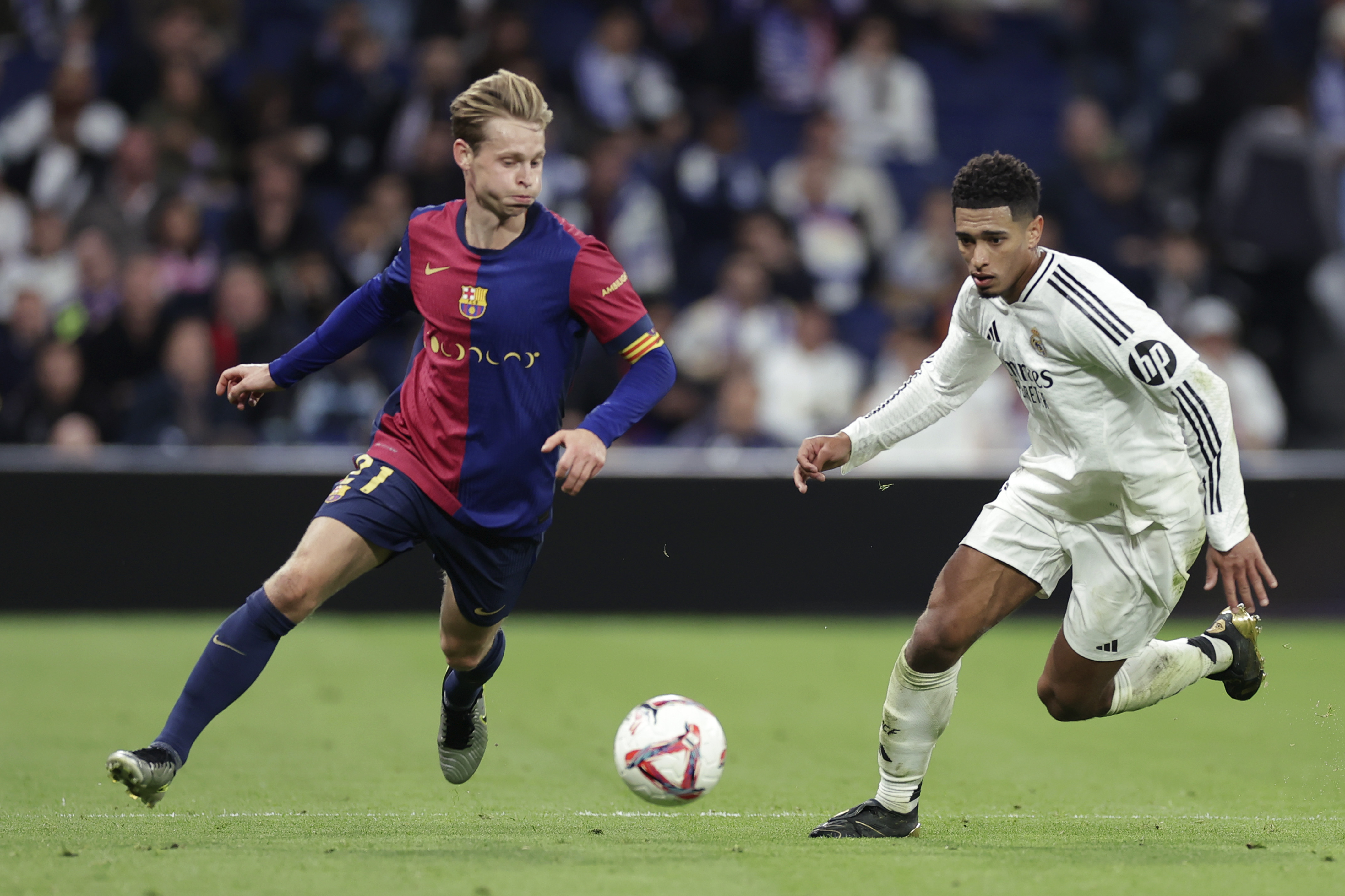Meet Ostersund: Sweden's miracle club with an English manager now aiming to upset Arsenal in the Europa League
Get to know Arsenal's next Europa League opponents: a club that signs English non-leaguers, makes them do ballet and once fooled Zlatan Ibrahimovic...
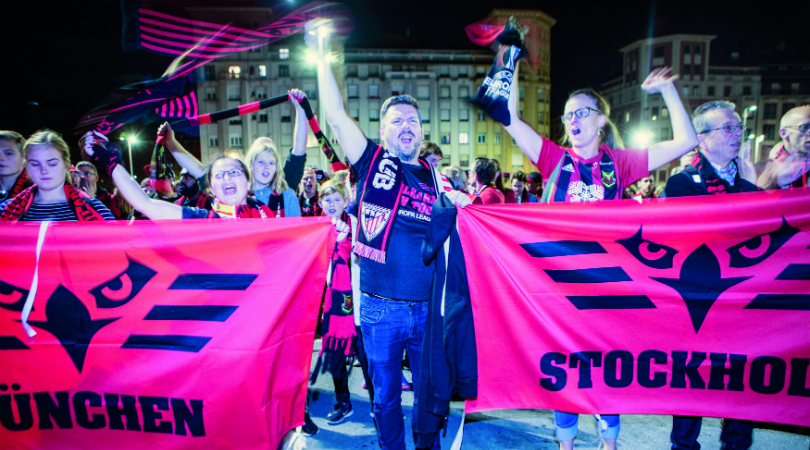
Photography: Markel Redondo
The people of the Basque Country have not seen anything like this before.
FourFourTwo are in Bilbao’s neoclassical main square, where five blokes from Middlesbrough are jumping up and down wearing sheriff hats, leading nearly 700 Swedes in an adapted version of the Will Grigg chant.
“The Sheriff’s on fire, your defence is terrified!” yelp the quintet in thick Teesside accents, one of them overcoming the difficulties of an artificial leg to bounce around with the other four. Elderly locals inquisitively peer from the balconies that overlook the square, wondering what on earth is going on.
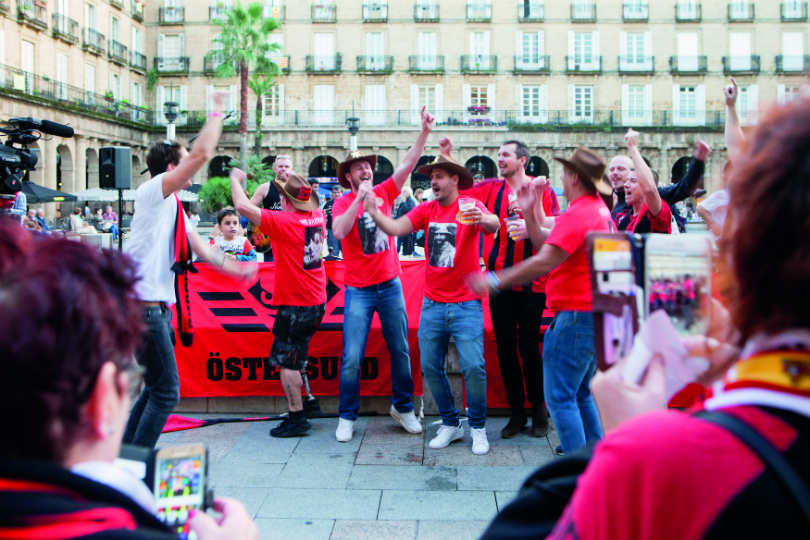
The fans of Ostersund have been wondering the same for some time now. Six years ago, the club from Sweden’s remote north were in their country’s fourth division, attracting 700 supporters to home matches. Now, the same number have jetted 1,500 miles to watch their heroes go up against Athletic Bilbao at the 53,000-capacity San Mames in the group stage of the Europa League.
Not only that, they go into the game top of the group after a campaign that has already seen them defeat Galatasaray, come from two goals down to beat PAOK, then overcome Hertha Berlin – and only an 89th-minute equaliser denied them a win in the reverse fixture against Athletic.
How has all this happened? The five blokes from Middlesbrough are a clue. This is a story that could not have occurred without a bunch of Englishmen who struggled for opportunities at home, but have helped Ostersund achieve what seemed virtually impossible.
Get FourFourTwo Newsletter
The best features, fun and footballing quizzes, straight to your inbox every week.
First-team gaffer Graham Potter has masterminded it all. And the Teessiders gathered in the square are the friends and family of Curtis Edwards, a midfielder who became the latest English player to sign for the club having flitted around non-league with Darlington, Thornaby and Spennymoor after being released by Middlesbrough.
Edwards is nicknamed ‘The Sheriff’ by fans of the Swedish side – hence the hats – and the 23-year-old’s face also adorns T-shirts that his personal fan club have had made for the day trip. They could easily be mistaken for a stag party, such is the attire and exuberance on show. “To see Curtis play here tonight will be unbelievable,” says Edwards’ dad Paul, taking a break from the chanting to chat to FFT.
“He couldn’t get a club at home, he played non-league and we wondered whether he’d need to do something else. So he moved to Sweden and it wasn’t fantastic money, but he’s coped brilliantly. He got a goal in the home game against Athletic Bilbao a couple of weeks ago. We were at home watching it on TV, his mam and myself screaming at the telly. For any kid out there who thinks about giving up, never give up. We wanted to be here for this game.”
And so did FourFourTwo.
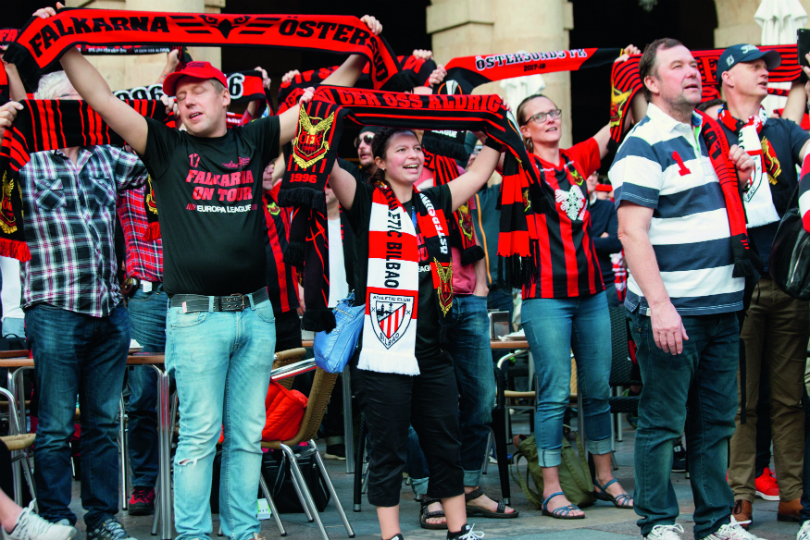
Dance or be sacked
It is not just the Edwards clan who feel like having a sing-song on this sunny afternoon in Bilbao’s Plaza Nueva – Ostersund chairman Daniel Kindberg steps up, supporters joining in with his rendition of a club chant. It’s a moment in paradise for fans who thought they would never experience a day like this. Kindberg is the man who lured Potter to Ostersund, transforming them from a club going nowhere in Sweden’s lower leagues, where they’d been since their formation in 1996, into a European force.
His back story and methods are far from conventional.
A lieutenant colonel in the Swedish army, he undertook missions amid war zones in Bosnia, Kosovo, Libya and the Democratic Republic of the Congo, and saw things he never wanted to. “You can’t escape from your experiences and a lot of these things I carry with me,” says Kindberg, away from the party atmosphere of the square. “It’s part of you. It builds you.”
He has had scary experiences in Sweden, too, not least when he was kidnapped in Stockholm. “I was kidnapped other times as well, but yes, I was taken in Stockholm,” he reveals. “They probably would have taken me out of the world – that was the purpose. But I had the training and the opportunity to fight myself out when we stopped at a gas station. They hit me badly but I took myself to a safer location, then to hospital.”
Who were these people? “It was because of my work and because of who I was and what I did,” explains the 50-year-old. “But everything is very classified.”
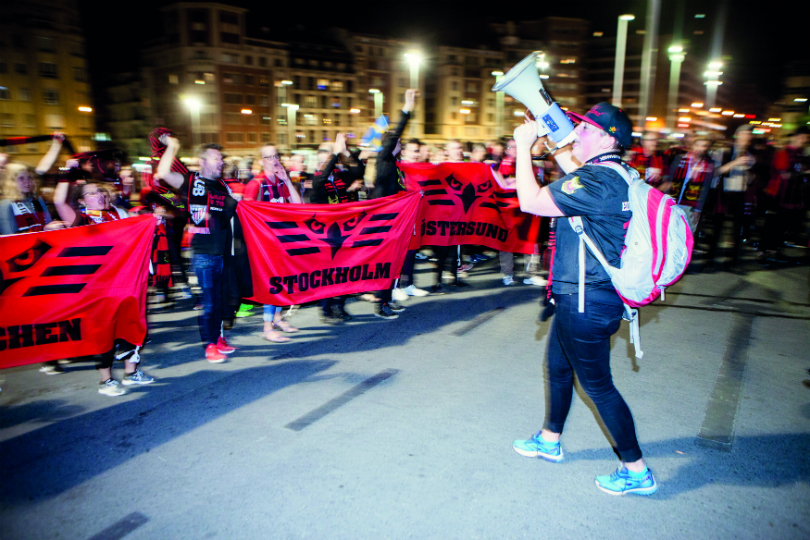
He first became involved with the club in 2005 and played his part in the appointment of Ostersund’s first English manager Neil McDonald, Sam Allardyce’s former No.2, in 2007. However, when Lee Makel’s reign as boss did not work out, and Ostersund were relegated to the fourth tier in 2010, Kindberg quit the board in frustration, only to get a knock on his door from the players.
A few of the lads met up with Zlatan afterwards and he thought it was very good. He actually thought they were professional dancers!
“They told me they’d had a meeting and decided I should come back,” he says. “They said: ‘If you don’t come back, all of us will quit.’ I replied: ‘Hold on, that’s blackmail!’ They said: ‘Yes, it is.’ I agreed to come back on the condition that everybody else on the board quit, so we could start again. We had to create a new identity, kill the blame culture and create something that would encourage people to be brave.”
How Kindberg went about that was highly unusual: deciding that the entire playing squad should take part in a variety of non-football projects to move them outside their comfort zone and develop a unity that’s been crucial to their progression ever since. The club created art for an exhibition, formed a book group and, most notably, have taken to the stage for a range of public shows.
They include performing a Swan Lake ballet, another play in which left-back Dennis Widgren pretended to be a cow, and a choreographed dance on TV at Sweden’s player of the year bash, with Zlatan Ibrahimovic in the audience. “A few of the lads met up with Zlatan afterwards and he thought it was very good,” laughs Kindberg. “He actually thought they were professional dancers!”
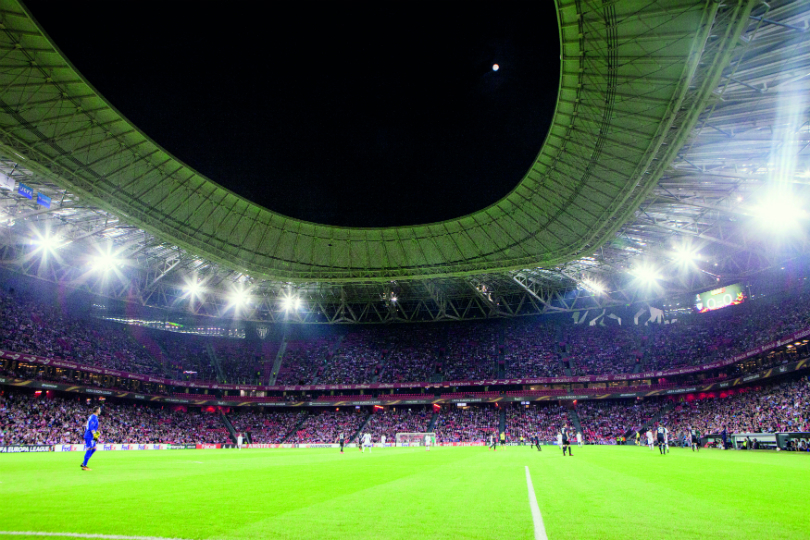
All players must participate in each stage performance. “They have it in their contracts,” adds the chairman, who also joins in. “There was only one time, five or six years ago, when a player questioned it, saying: ‘I’m a footballer, I’m not doing theatre.’ I replied: ‘But you don’t decide the training methods at the club, we agree on that? If you don’t want to do it, it’s fine, but then you have to play for another club.’ He asked: ‘Am I getting sacked, then?’ I told him he was.
“This is a method of training for us. It grows the human being, and everything has a connection to help us win games. Some say it’s a PR thing but it’s not – believe me. It’s not that fun to dance to Swan Lake! F**k me, that’s tough, and I have been in some tough situations in my life. People think all footballers are alpha males but, Jesus, if you go out and dance to Swan Lake you feel really small – you become extremely humble. I’ve seen fear in their eyes, but once they’ve done it it’s like the happiness when you win the league title - in fact it’s a deeper thing, as we’ve won together over ourselves. Nowadays the players are excited about doing it.
“We can’t fight in the numbers game. We don’t have the money. We have a turnover of £5.5m, Athletic’s is £120m, Galatasaray’s was £145m, so we have to find a different path to success. We can’t just do what everyone else does – we have to do the opposite and that is our way. From the beginning, when I became the chairman, I made it clear that we should play in Europe. People laughed their heads off, but we believed in it.”
That is why Kindberg is serious when he reveals his ultimate target: to become champions of Europe. “To win the Champions League we’ll need a turnover of £50m,” he explains. “But that would be the easiest investment for anybody who loves football. When we have a turnover of £50m, we will win it. We’ve proven that. We’re only at the beginning of our journey.”
From non-league to the Europa League
On a more restricted budget right now, Ostersund have found hidden gems, players discarded by other teams, and improved them beyond recognition. And the most important hidden gem of all has been the manager, Potter, who Kindberg brought to the club immediately after becoming chairman in December 2010.
I regard Graham Potter as one of the most promising managers in all of Europe. He’s a remarkable man
Potter’s playing career was not particularly illustrious: he played only eight games in the Premier League for Southampton during 1996-97 – eight games that included the famous 6-3 trouncing of Manchester United and the, er, infamous Ali Dia match against Leeds.
Retiring after spells with West Brom and York City, Potter coached at the University of Hull and at Leeds Metropolitan University, completing a masters degree in leadership and emotional intelligence, before being recommended to Ostersund by Graeme Jones – Roberto Martinez’s No.2 for Belgium, Everton and Wigan Athletic and a mutual acquaintance of Kindberg.
“I regard Graham Potter as one of the most promising managers in all of Europe,” says Kindberg. “He’s a remarkable man - very intelligent, a good person and a fantastic leader. He understands people and his tactical awareness is absolutely top European standard. He could take charge of any club in Europe tomorrow, but I’m not sure they have the chairmen of the standard to cope!”
Potter led Ostersund to back-to-back promotions, later taking them into the Swedish top flight for the first time. An eighth-placed finish in their debut campaign in 2016 was encouraging, but things have gone stratospheric in 2017. A 4-1 victory over Norrkoping in April’s Swedish Cup final earned them a berth in the qualifying rounds of the Europa League, the competition in which Potter’s men have made headlines all over the continent. “In Ostersund, they’re looking at building a statue of him,” says fan Daniel Goucher. “He deserves it.”
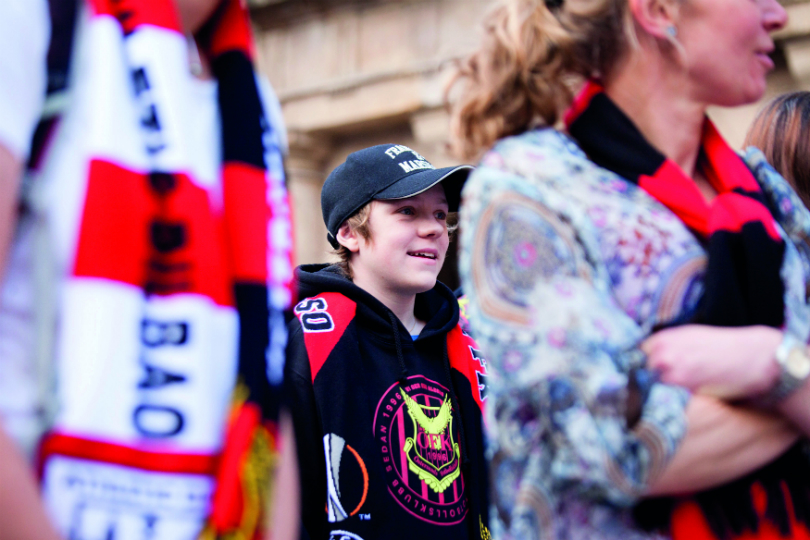
FFT caught up with Potter a night earlier, after the pre-match press conference at San Mames. An affable Brummie who conducts his work in English – most Swedes speak the language fluently – he has shown what can be achieved by moving abroad. In his case, to an isolated city of 50,000 people where the predominant sport until recently had been cross-country skiing and where temperatures plummet to well below zero in winter, with only four and a half hours of daylight.
Potter says he’s in no hurry to leave Ostersund. However, his growing profile makes links with jobs in England inevitable amid comparisons with Roy Hodgson, who made his name at Swedish outfits Halmstad, Orebro and Malmo. Until David Unsworth temporarily took charge of Everton, Potter was the only English manager in this season’s Europa League or Champions League. “You never know in football, but I’m happy where I am,” he tells FFT.
“Games like this are exciting and there is still work to do here because we want to win the Swedish league [they improved to fifth this season]. I had five years working at universities, which was great as you could try things and make mistakes. If you didn’t get the results you weren’t going to get sacked. I wanted to try the real world, but opportunities weren’t so easy to get back into the English game. Then this job came up. It was a big move for the family – we’re a 45-minute plane journey north of Stockholm, eight hours in the car – but it’s been great.
“The season we’ve had has been amazing. Beating Galatasaray in qualifying was a huge moment for our confidence. We won 2-0 at home, got a draw away and had an ovation from the Galatasaray fans at the end. That was incredible.”
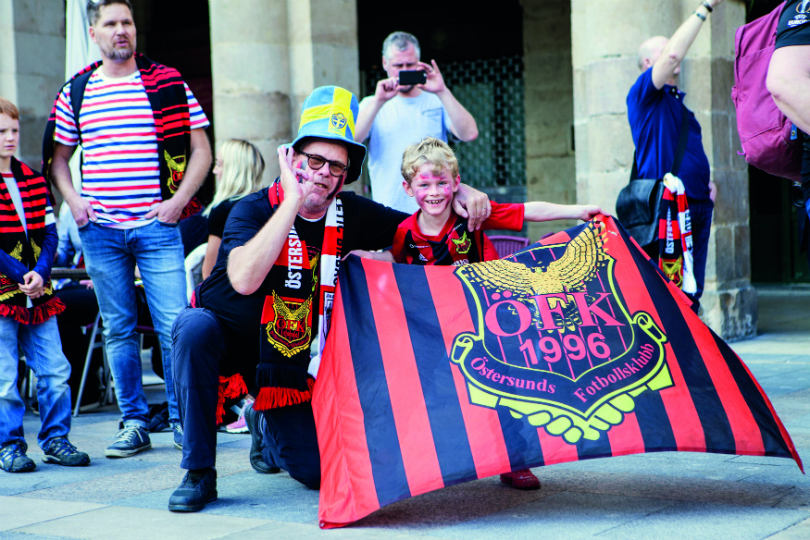
One Galatasaray supporter didn’t take it quite as well, setting fire to his season ticket in front of the TV cameras. Few had given Ostersund any chance whatsoever. It was regarded as a glamour fixture that would deliver an immediate Europa League exit, and Ostersund’s players had celebrated when they heard they’d been drawn to face the Turkish giants. But the tie made a hero out of ex-York and Tadcaster Albion midfielder Jamie Hopcutt, one of the goalscorers and another Englishman who has played a huge part in the club’s rise. More Brits have had spells there with Potter, including goalkeeping duo Connor Ripley and Jamal Blackman.
Ostersund fans were rather outnumbered in Istanbul – although home crowds have risen to 8,000 at the Jamtkraft Arena this season, the trip to Bilbao is the first time they’ve taken a significant away following in Europe.
“There were 25 of us at Galatasaray – we were shouting and trying to make ourselves heard but after one minute of the game we said, ‘There’s no point!’” laughs supporter Kjell Wenna, whom we meet up with on matchday under a 30-foot spider sculpture outside Bilbao’s Guggenheim museum. “For our first game in the group stage, against Zorya Luhansk in Ukraine, there were just the three of us in the away stand – and we won 2-0!”
Against Zorya Luhansk in Ukraine there were just three of us in the away stand – and we won 2-0!
One of the scorers that night was Saman Ghoddos, who had secured Ostersund’s place in the group stage with two late strikes to overturn a 3-1 first-leg deficit against PAOK. The forward joined the club in the second tier and is now heading for the World Cup, having established himself in the Iran squad.
Captain Brwa Nouri, who scored the winning goal in the team’s second group match at home to Hertha Berlin, has earned his first caps for Iraq, and defender Gabriel Somi was called up by Syria for the World Cup play-off with Australia. Midfielder Ken Sema, of Congolese origin, has been selected by Sweden.
My friends’ children say their favourites at the moment are Ken Sema, Jamie Hopcutt and then Neymar
Ostersund’s success has provided the opportunity for players of all backgrounds to become idols. “My friends’ children say their favourites at the moment are Ken Sema, Jamie Hopcutt and then Neymar,” says fan Per Ekman.
Darkness has fallen in Bilbao and it’s time for Ostersund’s 700 fans – many from the team’s official Falcons fan club – to march from the Plaza Nueva, a mile and a half across the city, to the stadium. They are chaperoned by Spanish police but there is never the slightest chance of trouble as they sing at the top of their voices, bringing the shopping district to a standstill as locals stop and stare.
The travelling fans soon take their seats high in one corner of San Mames, Athletic’s majestic new home which replaced the old ground of the same name and will host matches during Euro 2020. The attendance surpasses 32,000 tonight, and as the players enter the field for kick-off there is a beaming smile on the face of Edwards, unable to contain his joy at playing in such an arena.
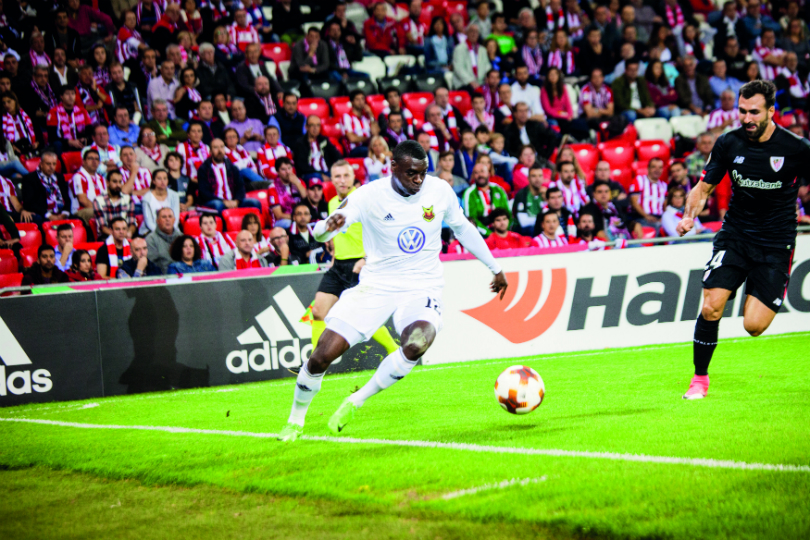
Five days earlier Lionel Messi and Barcelona played here, now it’s Ostersund. Not that they’re here just to enjoy it, and they’re not here just for a draw either. They have seven points from three matches, five points more than Athletic, and they’re here to win – something Potter’s made clear pre-match in line with the club’s attacking philosophy.
However, Athletic are Europa League stalwarts and Ostersund find it hard to gain a foothold, although their organisation in defence restricts the hosts to few chances despite swathes of possession and 10 corners before half-time. The visitors are sporadically dangerous on the break, but Potter is not satisfied. A coach known in Sweden for his tactical flexibility, he switches from a 3-5-2 formation to 4-4-2 at the interval. He’s not a man to cling on for a 0-0 draw.
For a period after half-time, Ostersund enjoy a greater share of possession – Edwards appears much more comfortable in central midfield, having started at right wing-back. Athletic’s players and fans are growing ever more frustrated, against a side who nearly beat them in Sweden two weeks earlier, but there is a nagging sense that Ostersund will do well to get to the end without Aritz Aduriz finding the net. Aduriz always scores for Athletic in the Europa League, netting 17 times across the past two seasons despite turning 36 in February.
Sure enough, with 20 minutes of the contest remaining, Raul Garcia’s effort crashes back off the crossbar and Aduriz heads home the rebound, sparking scenes of relief among the Basque support. Potter quickly reacts by introducing Hopcutt from the substitutes’ bench, and Athletic are hanging on during the closing stages after defender Unai Nunez is shown a second yellow card – and a then red – for halting Somi’s dash.
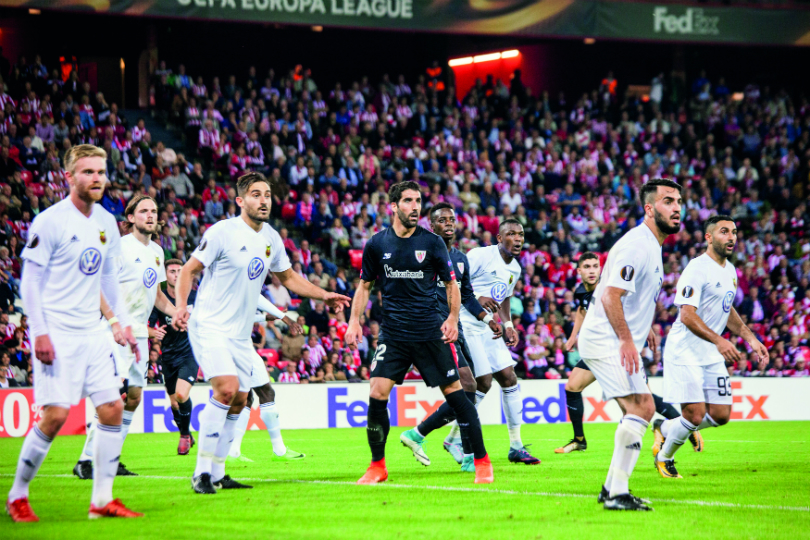
Edwards collapses to the turf with head in hands at the final whistle, his disappointment at the narrowest of defeats an indication of how far Ostersund have come. The travelling support applaud heartily and, just as at Galatasaray, even the home fans clap the visiting players as they leave the field. Everyone around Europe is starting to appreciate the Ostersund story.
We’re rapping this year
“That applause doesn’t come for nothing,” Potter tells FFT afterwards. “Over the two games against them, I think they appreciated all of our effort and what we were trying to do. The character of our players was tremendous tonight.”
Still top of the group with two games to play, attempting to become the first Swedish side to reach the last 32 for a decade, the squad now have other business to attend to before the next Europa League clash – the club’s annual theatre show, for which they have been rehearsing between training sessions.
FFT spot Ostersund’s former cow imitator Widgren in the post-match mixed zone, but we quickly sense he’s not in the mood to talk about his bovine escapades. Curtis Edwards is a bit cheerier, however – the disappointment of defeat remains, but the smile’s returned to his face after playing inside San Mames.
“It’s been an amazing experience,” he reveals. “On the pitch you don’t feel as nervous as when you’re singing on your own on stage. We’re rapping this year with every player doing 25 seconds each. It’ll be fun.”
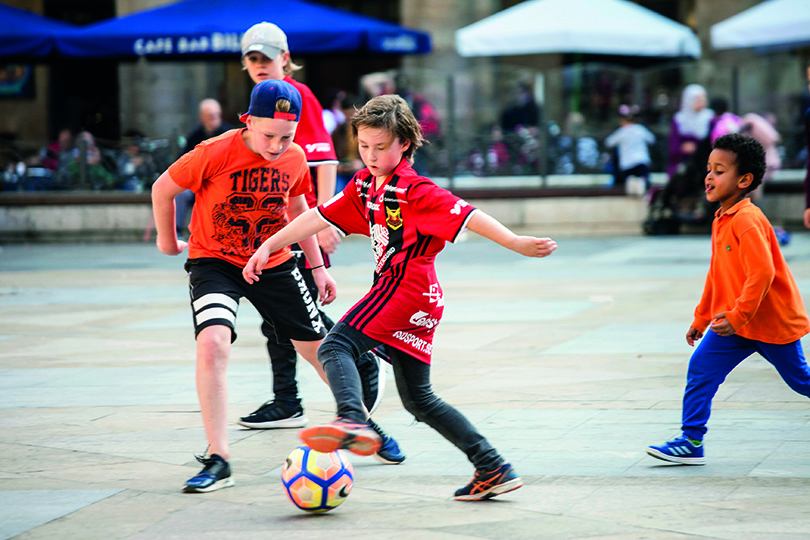
At no other club in Europe could post-match chat turn so seamlessly from football to rap. Having conquered their fears on stage, it’s little wonder they’ve been undaunted by the big stage of European football throughout 2017-18.
“I’m very fortunate to have chosen the right path by coming to this club,” says captain Nouri. “It’s been a journey, and they say happiness is not the destination, it’s the journey. If you zoom out of tonight and think about this whole experience, you can’t be anything but proud.”
This feature originally appeared in the January 2018 issue of FourFourTwo magazine. Subscribe!
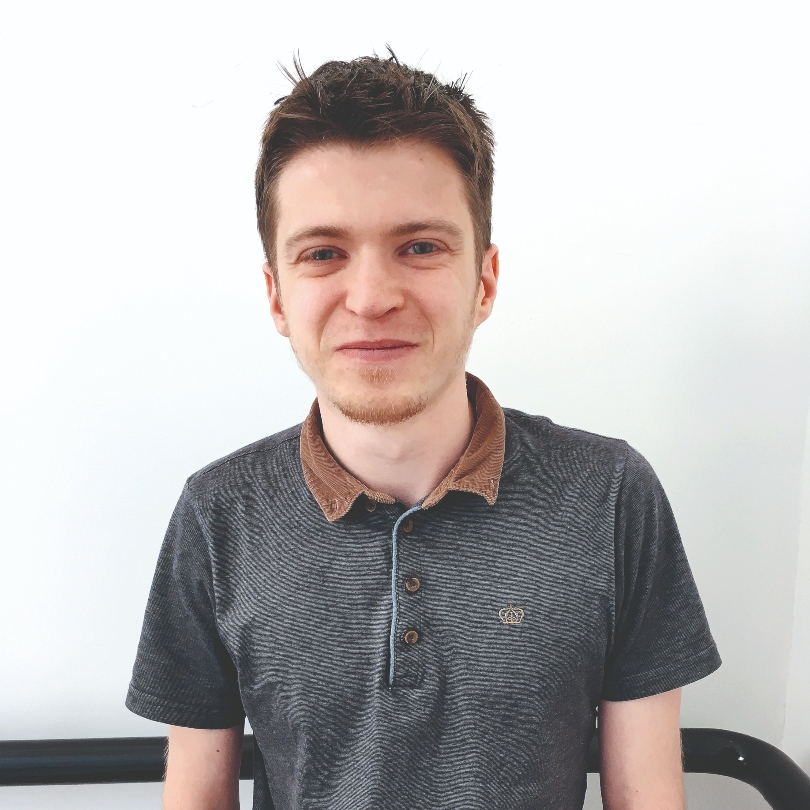
Chris joined FourFourTwo in 2015 and has reported from 20 countries, in places as varied as Jerusalem and the Arctic Circle. He's interviewed Pele, Zlatan and Santa Claus (it's a long story), as well as covering the World Cup, Euro 2020 and the Clasico. He previously spent 10 years as a newspaper journalist, and completed the 92 in 2017.
